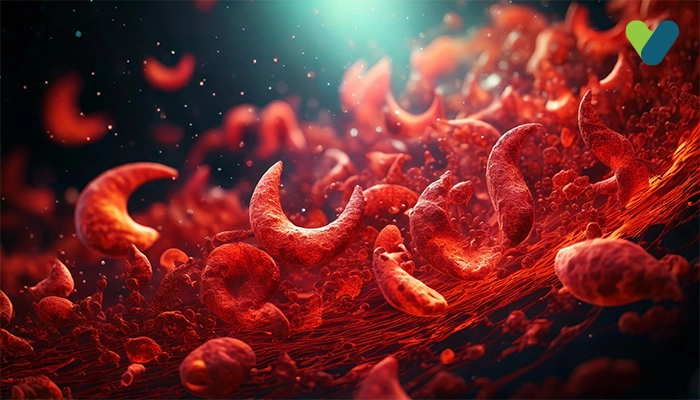Sickle Cell Anemia is also known as Sickle Cell Crisis is a genetic disorder of the RBCs or Red Blood Cells. Shaped in disc-like formations, the RBCs are capable of traveling to the smallest blood vessels. But those suffering from Sickle Cell Disease have abnormally shaped RBCs, which are stickier and get trapped in the blood vessels. This then leads to tissue damage and extreme pain.
Let us acquaint you with all about Sickle Cell Anemia and learn about the best Sickle Cell disease Treatment
Types of Sickle Cell Disease (SCD)
The main protein found in red blood cells is hemoglobin. Hemoglobin is composed of two alpha and two beta chains. Therefore, there are four types of sickle cell anemia crisis that are caused due to the mutation of these four genes and they are:- Hemoglobin SS Disease: This is the most common type of sickle cell crisis when a person inherits the same hemoglobin S gene from both parents.
- Hemoglobin SC Disease: This is the second most common type of SCD. Here, a person inherits the Hb S gene from one parent, and the Hb C gene from the other parent.
- Hemoglobin SB+ Thalassemia or Beta SCD: This type of SCD affects the production of the beta-globin gene. Here the RBC size is very small and the symptoms are not very serious.
- Hemoglobin SB O Thalassemia or Beta-Zero SCD: This is the fourth common type of SCD, where the symptoms are similar to Hb SS anemia.
Causes of Sickle Cell Anemia
As told before, sickle cell anemia is a genetic disorder caused due to a change in the shape of the red blood cells. When the shape of the otherwise round RBCs changes, it finds it difficult to pass through the blood vessels. As a result, there is difficulty in supplying oxygen and nutrients through the blood to all parts of the body. Generally, a person suffers from sickle cell crisis, when he/she inherits the hemoglobin affected with sickle cell anemia from his/her parents.Sickle Cell Anemia Symptoms
The easiest to detect symptoms of sickle cell crisis is pain. If you are experiencing pain in any part of your body, it could be a sickle cell crisis. The pain that doesn’t subside for several hours and days, can be a clear sickle cell crisis symptom. Some of the common symptoms of sickle cell crisis are:- Pain in the belly
- Pain in the lower back
- Pain in the chest
- Pain in hands and feet
- Painful erections in men
- Extreme tiredness
- Difficulty in breathing
- Weakness
- Yellow Skin like Jaundice
- Bedwetting
Sickle Cell Anemia Treatment
Several treatments are found effective for a sickle cell crisis:- Pain Medication: In most cases, a sickle cell crisis is treated through over-the-counter medications like morphine.
- Supplemental Oxygen: This is a treatment where supplemental oxygen is given using a mask to ease breathing and improve the oxygen levels in the blood.
- Blood Transfusions: Third effective sickle cell crisis treatment is blood transfusions to improve the way oxygen and other nutrients are transported via blood.
- Rehydration with Intravenous Fluids: Your doctor may also prescribe rehydration using intravenous fluids to allow the RBCs to return to their normal shape.
- Immunization: Another effective treatment for SCD is immunization. It helps to prevent further infections and helps those with weaker immunity.
- Droxia and Hydrea: Up next, some doctors prescribe Droxia and Hydrea to allow a healthy production of fetal hemoglobin to reduce the total number of blood transfusions.
- Treating Underlying Infections: Lastly, one could think of treating the underlying infections to treat sickle cell anemia as a whole. It is because, in some cases, some other underlying infections may lead to Sickle Cell Disease or SCD.


